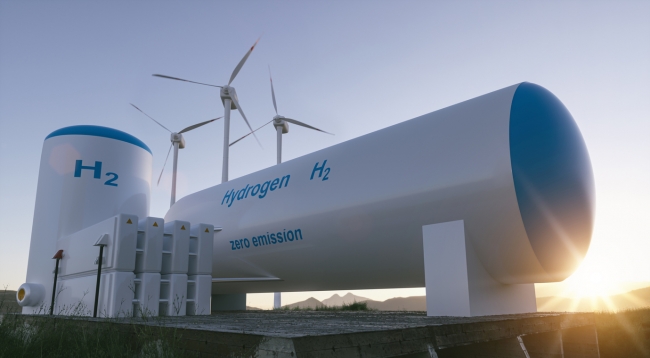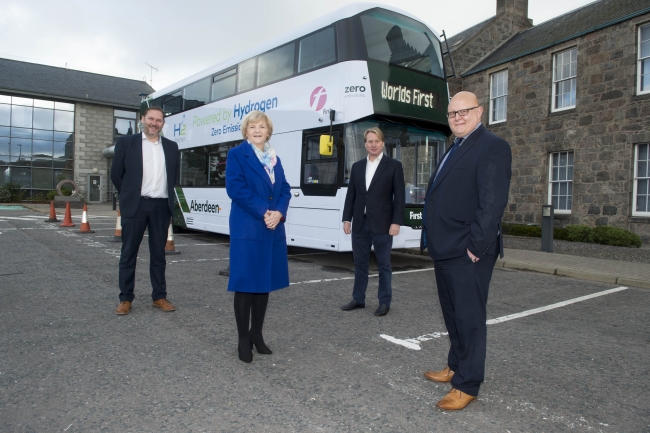4 minute read
Plans revealed for new multi-million pound hydrogen production plant in Scotland
Plans for a £45m commercial hydrogen production hub near Glasgow – aiming to be the first of its kind in Scotland – have been revealed.
The plant, which will harness solar and wind power to produce green hydrogen, is being developed by Scottish energy firm Hy2Go. Work will start on the project early next year, with the ambition that the facility will be partially up and running later in 2021, and in time to provide Scottish hydrogen fuel to transport COP26 delegates around Glasgow.
The 51-acre plant at Lesmahagow, Lanarkshire, will have its own wind turbines and solar panels which will feed a 9MW hydrogen electrolyser, with the capacity to increase the electrolyser size to 20MW in a second-phase expansion.
An estimated 16 jobs will be created during construction of the facility, with a further 16 permanent jobs created when the hub is fully operational.

Plans have been revealed for a £45m commercial hydrogen production hub near Glasgow / Picture: Getty/iStock
The facility will initially produce 800,000 kg of hydrogen per annum, with production eventually increasing to 1 million kg per annum. Use of this zero emission hydrogen would be the equivalent of removing 7,500 cars off Scottish roads every year.
UK-based hydrogen company, Ryse Hydrogen, has enabled the project to get off the ground by agreeing a significant offtake agreement for the plant’s hydrogen once fuel production commences.
Hy2Go co-founder and director, Simon Coakley, said: “It’s great to see the Hy2Go project finally coming to fruition after having had the vision for so long and we’re pleased that Ryse Hydrogen is sharing in our ambitions. With the combination of the creation of jobs and green hydrogen, it’s going to be a great boost for the area and for the environment.”
It is anticipated that the hub will secure Scotland’s future as a leader in the hydrogen sector, which is estimated to be worth £18bn to the UK economy by 2035 and could create 75,000 jobs in the UK. The Scottish Government is due to publish a hydrogen action plan by the end of the year, which will aim to grow Scotland’s hydrogen industry over the coming decades.
Hy2Go chairman, Brendan Flood, said: “With the fleet of Wrightbuses on the streets of Aberdeen, and Glasgow already in possession of a fleet of hydrogen-powered gritters with refuse trucks on their way, the need for Scotland to produce its own green hydrogen is clear.
“The positive relationship we’ve built with Ryse Hydrogen means that we’ve been able to get this scheme underway, safe in the knowledge that we’ve got a high quality anchor customer secured for the project. This facility will not only make Glasgow a strategically important part of the hydrogen economy, but will put Scotland and the UK on the hydrogen map. The global hydrogen sector is gathering pace and we intend to be at the forefront of the energy revolution.”

The world’s first hydrogen-powered double decker bus was recently unveiled in Aberdeen / Picture: Aberdeen City Council
Ryse Hydrogen is owned by Jo Bamford, who also owns Wrightbus – creators of the world’s first hydrogen double deckers, the first of which were recently launched onto the streets of Aberdeen.
Jo Bamford added: “There is now the inspirational prospect of Scottish-made hydrogen being used to transport COP26 delegates around Glasgow. This would be an ideal demonstration to the world that Scotland is perfectly placed to be a world-leader in hydrogen production because of its abundance of wind and water, which are the two ingredients you need to make hydrogen.
“It’s an exciting prospect to know that UK-built hydrogen double-decker Wrightbus buses will soon be travelling on the streets of Scotland, emitting only water vapour from Scottish hydrogen fuel that has been produced by harnessing the county’s own natural elements.
“Our relationship with Hy2Go will prove pivotal not only to Glasgow if it is to hit its ambition of becoming the first net-zero UK city by 2030, but will also be vital to the wider Scottish economic recovery. We’re confident the Hy2Go production plant will help lead Scotland’s emerging hydrogen economy, creating jobs and investment opportunities now and in the future. This scheme is a clear indicator that private businesses are ready and willing to invest in hydrogen to create jobs and to benefit the environment.”
Touted as the best alternative renewable fuel to power everything from buses, trains, lorries, ships and planes, as well as for use in domestic central heating boilers and heavy industry, green hydrogen is made using sustainable methods and emits only water vapour.